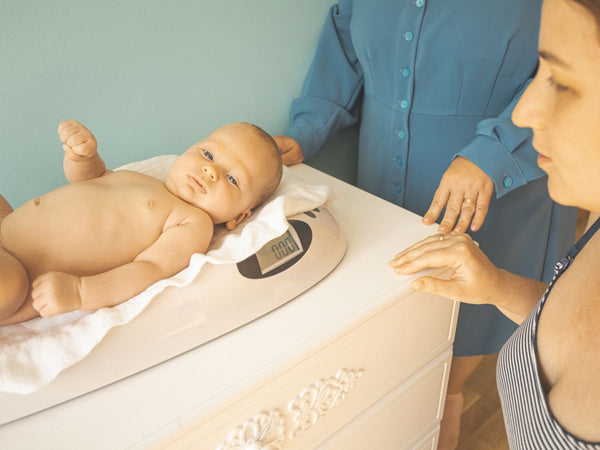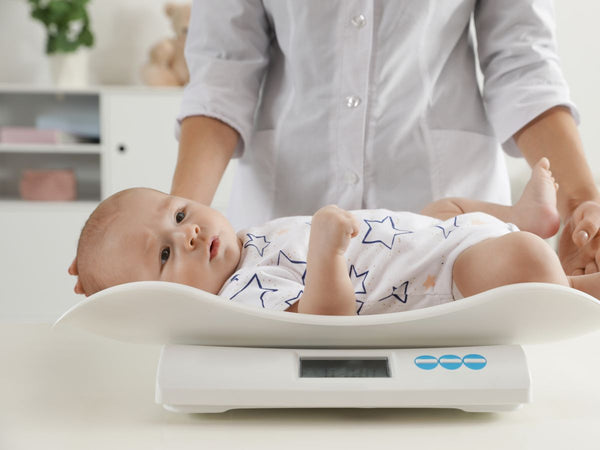Key Points
- Regularly measuring your baby's weight is crucial for identifying potential health issues
- Monitoring is part of routine health checks, with varying schedules across Australian states
- Growth involves various factors, including genetics, environment, maternal history, nutrition, and general health
Weight Gain in Babies
Measuring your baby’s weight at regular intervals will help give you reassurance that they are growing as they need to. An increase in weight from birth is a sign that they are feeding well and will help you to recognise if they have an underlying health or development issue.
In a general sense, a baby’s weight can help to identify if there are problems which need to be addressed before they become more complex.

What’s important to remember about baby weight gain
A baby’s weight is only one aspect of their growth. Generally, a baby’s weight is checked along with measurements of their head circumference and length at regular health checks. Frequent health checks are a good opportunity for a healthcare practitioner to determine a baby’s growth and general health.
Every Australian State and Territory has their own schedules for health monitoring. Check your baby’s Personal Health Record book for the ages and stages when their weight and growth need to be measured.
Babies are usually weighed:
- Once a month until they’re 6 months of age.
- Every two months between 6-12 months.
- Every 3 months after their first birthday.
Babies who were born prematurely, were small for gestational age, or have ongoing health issues need to have more frequent growth checks.
How a baby is developing and if they are reaching their milestones are other important measurements of growth and maturity. If you’re worried about your baby’s growth, remember there are other useful ways to check on their overall health and well-being.
Plenty of pale, wet nappies each day (at least 6), regular, soft poos and being generally happy and content are all other reassuring signs that milk intake is adequate.
Factors which affect a baby’s growth
At birth, a baby’s weight is strongly influenced by a mother’s general health and her diet during pregnancy.
Every baby is an individual and will gain weight and grow in their own unique way. Some weeks, babies gain more weight than others. A baby’s nutrition and feeding behaviours can help to understand more about an individual baby’s weight gain.
- Genetics – short parents tend to have shorter children. Tall parents tend to have taller children.
- Environment – a mother’s general health, the number of pregnancies she has had, the quality and type of food she has eaten during pregnancy, and a family’s socio-economic status all affect how a baby grows.
- Maternal history - if a mother has used substances or smoked cigarettes during her pregnancy, these can all can affect her baby’s birth weight and growth.
- Nutrition - breastfed babies have different growth patterns in the first year of life when compared to babies who are formula fed.
- Biological causes – babies who are large for their gestational age at birth have a higher risk of becoming obese when they are older.
- General health and wellbeing – being frequently unwell, having developmental delays, problems feeding, taking medications long term and certain medical conditions e.g., kidney or heart disease - can all impact growth. [1]
Expect your healthcare provider to ask you questions about your baby’s feeding history if there are any concerns about their weight gain.

Facts about baby weight gain
- Almost all babies born in Australia (94%) weigh between 2.5-4.5 kgs at birth.
- Girls tend to weigh less than boys at birth. First babies and babies who were one of a multiple birth generally weigh less.
- A weight loss of around 10% in the first week of life is normal. This is generally due to fluid loss and the baby using more energy as they adjust to ‘extra-uterine’ life.
- Most babies regain their birth weight by around two weeks after birth.
- When babies are sick, they generally don’t gain and may lose weight. When they’ve recovered, they may gain more weight than usual to ‘make up’ for what they have lost.
Average weight gain
Age |
Average weight gain |
|
0-3 months |
150-200 grams/week |
|
3-6 months |
100-150 grams/week |
|
6-12 months |
70-90 grams/week |
|
Between birth – 1 year |
Doubles birth weight |
|
2-5 years |
2 kg/year |
All babies grow at their own unique pace. [3]
Why growth charts are important
Growth charts help to ‘flag’ early problems with a baby’s growth. Poor growth in early childhood can have both short and long-term effects on a child’s general health and development. Poor growth, over time, can affect a child’s body composition, their learning and development as well as their growth potential.
Growth charts, also called percentile charts, help to compare an individual’s baby’s growth with other babies of the same age and gender. The best way to interpret what a growth chart means is to think of your baby as one in a group of 100. Your baby’s weight, head circumference and length will be measured and then compared with another (sample of) 99 babies.
The 50th percentile is an average measurement for all 100 babies and isn’t a ‘pass’ – 50% of babies will be above this line and 50% will be under it.
One-off measurements don’t give a good understanding of a baby’s growth. What’s important is the pattern of a baby’s growth over time.
Babies who are growing and thriving tend to follow the same curve or line. A sudden increase in a growth curve, especially for head circumference, needs checking and investigation. Poor growth can be seen when a baby’s weight and/or their length is tracking downwards on the percentile chart.
The growth charts currently used in Australia for babies aged between 0-24 months are the WHO (World Health Organisation) growth charts which recognise breastfeeding as the biological norm. [4] From the ages of 2-18 years, the CDC (Centre for Disease Control) growth charts are recommended.

When should I be concerned about my baby’s weight gain?
It’s always important to follow your ‘gut feeling’ about how your baby is growing and behaving. Sometimes, it’s hard for parents to describe what’s worrying them, but having your baby checked is always the right thing to do.
Take your baby to your GP and/or your Child Health Nurse if they:
- Are not feeding as frequently or there are changes in their feeding.
- If your baby’s skin looks ‘loose’, as if they don’t fit into their skin. This can mean they have lost weight or aren’t gaining weight as they need to.
- If your baby is sleepier than they usually are, or not waking as frequently for feeds.
- If you feel they’re sick or becoming unwell.
- If you’re breastfeeding and you feel your milk supply is decreasing.
- If your baby is vomiting, or there are changes in the frequency and consistency of their poos.
Remember – you are the expert when it comes to your own special baby and you know them better than anyone else. Although we cover a lot in our Antenatal Education resources, if you are unsure of anything at all - seek the advice from a professional.
About the Author:
Written for Nourish Baby by Jane Barry. Jane has qualifications in general, paediatric, immunisation, midwifery and child health nursing. She holds a Bachelor Degree in Applied Science (Nursing) and has almost 35 years specialist experience in child health nursing. She is a member of a number of professionally affiliated organisations including AHPRA, The Australasian Medical Writer’s Association and Australian College of Children and Young People’s Nurses.
References
Baby weight losses and weight gains | Australian Breastfeeding Association
[1] Child growth learning resource : Child growth in the early years (rch.org.au)
[2] Infant-feeding-guidelines-info-for-health-workers (13).pdf
[3] How your baby gains weight | healthdirect
[4] Child growth learning resource : Growth Charts (rch.org.au)
Our Products
-

01. Guide to a Healthy Pregnancy
$55 -

02. Positive Birthing Course
$55 -

03. Infant Feeding Guide
$55 -

04. Baby Sleep Guide - First 12 Months
$55 -

05. Toddler Parenting Course 1 - 3 Years
$55
-
 When to Start Antenatal Classes?
When to Start Antenatal Classes?
Becoming a parent is an incredible milestone, but it comes with a host of changes that can be daunting, especially for first time parents. Antenatal classes are all about offering expectant parents the education they need to make informed decisions, look after their bodies and care for their newborn babies. While you probably already have a long list of things you need to accomplish during your pregnancy, it’s a good idea to make time to attend antenatal classes.
-
 Development Milestones 4-8 Months
Development Milestones 4-8 Months
As they reach the middle of their first year, you'll start to see bigger leaps in their growth and ability!
In this article, we’re going to discuss your baby’s developmental milestones between 4-8 months, and what you can expect along the way.





 When to Start Antenatal Classes?
When to Start Antenatal Classes?
 Development Milestones 4-8 Months
Development Milestones 4-8 Months








